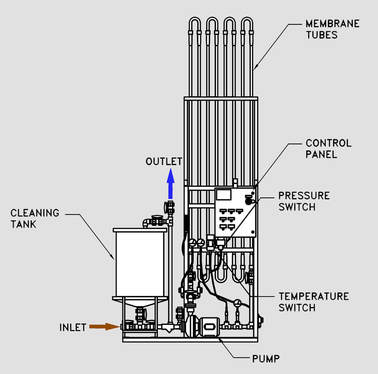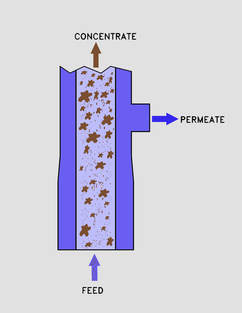ULTRAFILTERS (UF)Ultrafiltration (UF) is a continuous filtration process used to separate emulsified oils and suspended solids from wastewater. A porous tubular membrane allows the water (permeate) to pass while larger contaminants such as oils and colloids are retained and concentrated. The membrane surface avoids any build -up since the high velocity of the incoming water produces a scouring effect. Ultrafilters can provide absolute treatment to a wide variety of waste streams.
HOW IT WORKS
In general, ultrafiltration is a pressure driven process that performs separation via a semipermeable membrane. The waste stream is pumped into the the train of membranes. As the waste stream passes through the inside of the membrane, water and small solutes move radially outward through the membrane and toward the shell of the tube. This is called the "permeate." The larger particles, such as oils, are unable to pass through the membrane and form the "concentrate." The concentrate is recycled over and over to remove as much water as possible. The permeate can be discharged whereas the concentrate must be further treated or disposed. BENEFITS
|
EPS Wastewater LLC. • 601 Brooklyn Ave., Ste. B • Milford, OH 45150 • P: 513-718-1204
© Copyright 2017 EPS Wastewater LLC. • All rights reserved • Designed by SPL Studios
© Copyright 2017 EPS Wastewater LLC. • All rights reserved • Designed by SPL Studios


